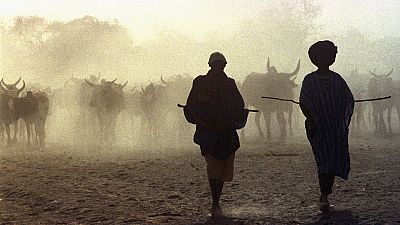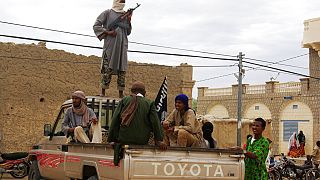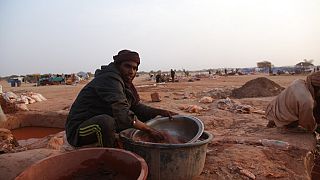Mali
Ayouba Ag Nadroun was at a market in central Mali in March when jihadists attacked his village, killing dozens of people and stealing cows and camels worth around $10,000.
“We lost everything,” the 62-year-old told The Associated Press by phone from the Menaka region.
Cattle looting is reaching unprecedented levels in Mali, with jihadists linked to al-Qaeda and the Islamic State group stealing millions of dollars worth of cattle to buy weapons and vehicles to fund their insurgency.
According to a recent report by the Global Initiative against Transnational Organized Crime, as jihadists gain ground, looting is increasing and fueling conflict among already impoverished communities struggling to feed and keep their families alive.
Mali has been struggling for over a decade to contain an Islamist insurgency.
Despite a victory in 2013, when France sent troops to help its former colony drive al-Qaeda-linked militants out of the country's northern regions, the violence has not only continued, it has spread. Attacks have spread to neighboring Niger and Burkina Faso, where extremists are exploiting people's grievances against the state to recruit fighters and control land.
While cattle rustling has been at the heart of Mali's war economy for years, the recent rise of jihadists is worrying, according to the Global Network report.
In the central region of Mopti, one of the hardest hit by recent violence, some 130,000 head of cattle were stolen in 2021, roughly the same number as between 2018 and 2020 combined, the report says. the global initiative is known as GI-TOC.
While the groups have multiple sources of funding, including drug trafficking, hostage taking, and gold mining, analysts believe cattle raiding is one of the most preferred methods due to inflows. money, especially in Mali, which is the region's second-largest livestock exporter after Nigeria. The jihadists loot cattle and then rely on a network to sell them and use the money to buy weapons and vehicles.
“Unlike other criminal markets (such as cocaine or kidnapping), cattle rustling has proven to be a resilient and stable source of revenue for armed groups, as Mali is a key regional producer and exporter of livestock,” said Flore Berger, Sahel analyst at GI-TOC. "Cattle rustling is likely to continue to provide sources of income because countries in the region will continue to buy cattle from Mali," she added.
Villagers say the jihadists are strategic in their thefts, spotting water points where they know livestock will come to drink.
"They settle next to the wells for several days and each time the thirsty animals come to get water, the terrorists take them", says Mahamad Ag Moustapha, mayor of the commune of Inekar, in the region of Menaka. Last April, this father of nine lost more than $84,000 worth of cattle when jihadists attacked his town. He now lives in a site for displaced people in Menaka.
"There are no animals within a radius of 300 km around the city of Menaka. ... The terrorists are trying to weaken the population economically so that they do not fund the resistance", did he declare.
Although it is difficult to determine how much money the jihadists earn by stealing cattle, analysts estimate that they seize animals worth tens of millions of dollars a year.
Net profits from cattle rustling in one district of Mopti region - under the influence of jihadists - amount to around $730,000 in one year, according to the report.
In neighboring Burkina Faso, where violence has raged since 2016, jihadists can earn $50,000 a month from cattle rustling in areas such as the Sahel, North and Centre - North , where they operate.
"We are aware that the money generated by the sale of stolen cattle is used to finance the activities of terrorists," Colonel Abdoulaye Dembele, spokesman for the Malian army, told AP. "It is difficult to protect Malian livestock from terrorists, the country is vast and our first concern is to protect the population," he added.
However, in recent months, "we have recovered several hundred heads of cattle in Mopti, in the center, and in the Menaka region. In both cases, we have handed over the cattle to the local authorities who will be responsible for tracing the owners. and to return the animals to them. If the stolen cattle are within a radius of our military camps, we can intervene, but if they are far from the military camps, it becomes difficult," he added.
Despite the increase in cattle rustling, conflict experts say it is not comparable to hostage-taking, a highly profitable business.
“We have heard unconfirmed reports that hostage ransom is the most lucrative source of income (for jihadists), generating around 30% of their income,” said William Linder, a retired CIA officer and director of 14 North Strategies, an Africa-focused risk advisory firm.
At least 25 foreigners and countless locals have been kidnapped in the Sahel since 2015, according to the Armed Conflict Location & Event Data Project. French journalist Olivier Dubois was kidnapped by jihadists in northern Mali in April 2021. He was released last month, but the conditions for his release, including the possible existence of a ransom, have not been disclosed.
However, the upsurge in cattle rustling is upsetting some people in the Sahel region more because it is undermining their ability to survive.
Two years ago, villagers in the Gourma region said they had noticed jihadists selling thousands of stolen cattle from villages at a third of the price, making it difficult for traders to compete.
Jihadists sell thousands of animals to meat traders who take them across the border to Burkina Faso or Niger, said a 34-year-old tea vendor at a market in the town of Gossi.
By controlling cross-border livestock markets, jihadists increase their legitimacy in the territory they take and reduce state control, points out Mucahid Durmaz, principal analyst at Verisk Maplecroft, a global risk intelligence firm.
"The constant flow of income allows them to acquire weapons, recruit new members, expand their power, and undermine the authority of the state," he said. To reduce revenue, governments in the Sahel region must establish their authority, strengthen border controls, regulate livestock markets, and gain the trust of local communities.











Go to video
Vladimir Putin affirms "full support" for Africa
Go to video
Chad: At least 17 soldiers killed in Boko Haram attack
Go to video
Kenyan man is convicted of plotting a 9/11-style attack on the US
Go to video
Burkina: Civilians needlessly exposed to danger, according to HRW
Go to video
At least 40 soldiers killed in attack on military base - Chad's president
00:41
Several dead and wounded in an attack at Turkish aerospace company